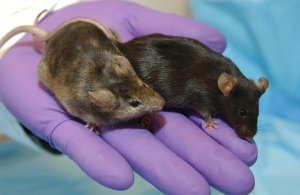Wellcome Trust Sanger Institute receives award from US National Institutes of Health
 The Wellcome Trust Sanger Institute today announces that it has been awarded funding by the prestigious US National Institutes of Health (NIH) to contribute to a consortium that will generate freely available genetic resources for biomedical research.
The Wellcome Trust Sanger Institute today announces that it has been awarded funding by the prestigious US National Institutes of Health (NIH) to contribute to a consortium that will generate freely available genetic resources for biomedical research.
The NIH have awarded a set of cooperative agreements, totalling up to US$52 million (£27.4 million) over five years, to launch the Knockout Mouse Project (KOMP). The goal of this programme is to build a comprehensive and publicly available resource of mutations in the mouse genome. The ‘knockout’ mice produced from this resource will be invaluable in the study of human disease.
The role of the Sanger Institute will be to generate and assess embryonic stem (ES) cell lines in which a single gene has been targeted and inactivated. The result of the Project will be to develop a collection of ES cells, each of which contains a mutation in one of the 20,000 or so genes in the mouse genome. The cells will be freely available to the entire scientific community.
“We are delighted with this award from the National Institutes of Health, the world’s leading public research funding organization. This is international recognition of the unique skills of the Wellcome Trust Sanger Institute and our proven record in producing valuable resources made freely available to the research community.
“Our mission is to use cutting-edge research methods to bring new understanding of normal biological activity and the role of genes in disease. Through this funding, we will be able to accelerate the contribution we can make to help researchers worldwide make advances against disease.”
Allan Bradley Director of the Wellcome Trust Sanger Institute
The work will be done by a consortium of the Children’s Hospital Oakland Research Institute in Oakland, CA (CHORI), the Wellcome Trust Sanger Institute, Hinxton, Cambridge, UK and the University of California Davis Mouse Biology Program (UCD-MBP).
CHORI will make the cloned DNA molecules designed to target defined genes in the mouse genome. The Sanger Institute will transfer these cloned DNA molecules into ES cells and identify ES cell clones with the appropriate genetic change. Using new technologies, more than 1 million ES cell clones will be assayed during the project. Five mutant ES lines will be archived for each gene. UCD-MBP will perform quality control on the resource, confirming that the targeted ES clones can be reliably turned into mice and will distribute the ES cell clones to the scientific community.
“Knockout mice are powerful tools for exploring the function of genes and creating animal models of human disease. By enabling more researchers to study these knockouts, this trans-NIH initiative will accelerate our efforts to translate basic research findings into new strategies for improving human health. It is exciting that so many components of NIH have joined together to support this project, and that the NIH Knockout Mouse Project will be working hand-in-hand with other international efforts. This is scientific teamwork at its best.”
NIH Director Elias A. Zerhouni M.D.
The new funding complements the resources in mouse genome sequence, DNA clones and ES cells that the Wellcome Trust Sanger Institute is generating through the International Gene Trap Consortium, the European mouse knock-out programme, EUCOMM, and other projects funded by the Wellcome Trust and the EU. To date, the Institute has produced cell lines containing mutations in more than 3,000 genes. The NIH Knockout Mouse Project will complement these and other large-scale efforts to produce knockouts that are underway in Canada, through NorCOMM and in Europe, through EUCOMM.
The organisations involved intend to coordinate their efforts closely in order to avoid redundancy and maximize the efficiency of generating knockouts for all genes in the mouse genome. Furthermore, the US, Canadian and European groups are committed to making their data and resources rapidly and openly available to researchers around the world.
Other international agencies and scientific projects supporting similar efforts to mutate mouse genes are encouraged to follow these principles and to join the international collaboration.
“Everyone involved in this international effort will benefit from working together and sharing their expertise. New resources and technologies developed as part of the research programme and shared freely with the wider community will allow scientists to further increase their understanding of health and disease.”
Dr Sohaila Rastan Director of Science Funding at the Wellcome Trust
More information
Selected websites
The Wellcome Trust Sanger Institute
The Wellcome Trust Sanger Institute, which receives the majority of its funding from the Wellcome Trust, was founded in 1992. The Institute is responsible for the completion of the sequence of approximately one-third of the human genome as well as genomes of model organisms and more than 90 pathogen genomes. In October 2006, new funding was awarded by the Wellcome Trust to exploit the wealth of genome data now available to answer important questions about health and disease.
The Wellcome Trust and Its Founder
The Wellcome Trust is the most diverse biomedical research charity in the world, spending about £450 million every year both in the UK and internationally to support and promote research that will improve the health of humans and animals. The Trust was established under the will of Sir Henry Wellcome, and is funded from a private endowment, which is managed with long-term stability and growth in mind.


